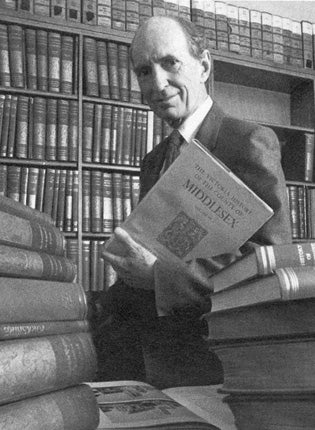Professor Christopher Elrington: Historian who devoted his career to the 'Victoria County History'

Christopher Elrington devoted the whole of his professional life as a historian to the Victoria County History, that magnificent encyclopaedic work attempting to provide fully researched and properly referenced historical accounts of all the counties of England and their more than 10,000 individual parishes. Some 250 large red volumes of the VCH have appeared since the endeavour began in 1899. Elrington had an increasingly influential hand in all the volumes that have appeared in the last 50 years.
He was General Editor of the whole enterprise from 1977 until 1994, having been Deputy Editor from 1968, and before that County Editor for Gloucestershire from 1960 to 1968, and originally assistant to the General Editor from 1954 to 1960. His first contributions were published exactly 50 years ago in 1959 – he compiled the index to the excellent economic history volume IV of the VCH Wiltshire, and in the same year he wrote three succinct articles about aspects of the University of Cambridge in the VCH Cambridgeshire, volume III.
The VCH, originally a private enterprise, had been based at the Institute of Historical Research at the University of London since 1933, entrenched in the old-fashioned if "modern" Senate House since the Ministry of Information faded away at the end of the War. Elrington brought a breath of fresh air when he arrived in 1954, combining, as he did, a twinkling irreverence with a scholarly commitment and a gift for encapsulating complex matters in a simple elegant phrase.
Christopher Elrington was born in 1930. He was the son of a military family, his father a brigadier, and educated at Wellington before himself undergoing national service, and then going to University College, Oxford, where he graduated brilliantly in history and took his MA. He then went to Bedford College in London and took a real MA, producing a thesis based upon detailed medieval research.
Elrington's predecessor as General Editor of the VCH was the austere R.B. Pugh, whose crab-like movements and old-fashioned buttoned–up bachelor suits had intimidated generations of research students at the Institute of Historical Research since 1949. Pugh and Elrington were – to use appropriate Wiltshire terminology - chalk and cheese. But Elrington always paid generous tribute to his mentor; certainly, they shared a scholarly concern for precision and clarity of provenance. In due course Elrington also succeeded Pugh as the President of the Wiltshire Record Society in 1984, the Society founded in 1937 by Pugh and described by Elrington (before he became its President) as "probably the very best" of the local record societies.
When I moved to Wiltshire in 2004 Elrington said with great enthusiasm, "You have chosen the best county". Soon afterwards I invited him to come as my guest to a dinner of the Essay Club in London, writing to explain that he did not need to write an essay, or – worse – listen to one being read, but that the name of the Club was a pun upon the Society of Antiquaries, the members being chosen from among the Fellows of that Society. "Yes, yes", he rang to say, "I know all about it, I've been before. Delighted to come, so long as you don't expect me to become a member." He hated joining clubs, he added by way of explanation.
He enjoyed the evening, evidently quite at home with the erudite scholarly gossip and banter, but he generally preferred to be at home, or exploring and travelling with his family. He had, after all, a very lively and charming wife (Wiltshire-born), who he had married in 1951 when she was involved in her first job of helping Sir Hugh Casson to construct the Festival of Britain. Jean Elrington was a working architect of great taste and style. They had a very happy marriage and a very happy family life with their twin son and daughter, and later grandchildren.
He was a Fellow of the Society of Antiquaries (elected 1964) and of the Royal Historical Society (1969), neither society requiring clubbiness. The only period he spent away from the VCH was a short period as a visiting scholar at the Folger Library in Washington in 1976. He received a wonderful accolade in 1994 with the publication of a Festschrift edited by the two Chrises, Currie and Lewis, with chapters systematically considering the historians of all the counties of England, a volume that should be on the shelves of all local historians.
In view of Elrington's distinction, the University of London in 1992 conferred upon him the title of professor (though he never taught in any formal sense); after his retirement in 1994 he became an Emeritus professor, a style which suited him admirably.
Elrington, for all his sympathetic writing about parishes and medieval thought and practices, was a sensible and intelligent atheistic rationalist. Confronted by the diagnosis of pancreatic cancer, he chose to die quietly and all too quickly at home, sadly a few months before his 80th birthday. He left his body for medical research. His places – the meetings in Wiltshire, the teas at the Institute of Historical Research, the laughter in Lloyd Baker Street, WC1 – will no longer for many be quite the same.
Negley Harte
Christopher Robin Elrington, historian and editor: born Farnborough 20 January 1930; Victoria County History: editorial assistant, 1954-60, editor for Gloucestershire, 1960-68, Deputy Editor, 1968-77, General Editor, 1977-94; Hon. Editor 1962-72 and President 1983-2009, Wiltshire Record Society; President, Bristol and Gloucestershire Archaeological Society, 1984-85; married 1951 Jean Buchanan (one son, one daughter): died London 3 August 2009.
Subscribe to Independent Premium to bookmark this article
Want to bookmark your favourite articles and stories to read or reference later? Start your Independent Premium subscription today.

Join our commenting forum
Join thought-provoking conversations, follow other Independent readers and see their replies